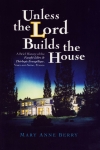 In demographic terms, Evangelicalism in France amounts to a third of all French Protestants.
In demographic terms, Evangelicalism in France amounts to a third of all French Protestants.
In terms of practicing Protestants, however, the rate is very different. Around two thirds (if not three quarters) of practicing Protestants in contemporary France are Evangelicals.
But lots of research still needs to be done in order to know better these French born-again citizens.
Fortunately, books, articles and testimonies slowly come to help us.
One of the areas in which there is still much academic work to be done is schools and faculties. Where do French Evangelicals train themselves? What about their curriculum, their teachers, their Alumni?
Let's thank Mary Anne Berry for providing us with some valuable information through her new book, devoted to explain, from a believer's point of view, the history of one BIG French Evangelical "hub": the Faculté Libre de Théologie Evangélique of Vaux-sur-Seine(located West of Paris).
Lorraine and John Winston's impact
This Evangelical faculty was created in 1965. Since then, it has served as the main training "hub" for French Evangelical ministers, at least for those who wanted a solid Academic training.
Unless the Lord Builds the House (ed. FLTE, Vaux-sur-Seine, 2011) provides us with precious insights on the history of this particular institution. In an easy-to-read format (102 pages), based upon some primary sources research and many interviews with former students and faculty, including John and Lorraine Winston (a couple who played a pivotal role in the creation and the growth of this institution), the author sheds a fresh light on this French Evangelical seminary.
Published courtesy of Tyndale House Publishers, this book is illustrated with some pictures, various biographical sketches, and testimonies, which will delight future historians of French contemporary Protestants.
This history is viewed from an "insider's perspective", so one cannot be surprised by the Christian worldview which prevails through the narrative. However, dark spots and problems are not hidden, including financial challenges due to very bad mismanagement (chapter Eleven, "A Time of Testing"). John Winston's role (he served as a Dean for the first twenty years) is rightly emphasized, as well as the international dimension of the Faculty, which is focused not only on France, but on the whole French-speaking world (Switzerland, Quebec, Belgium, Africa...).
Overall, in spite of some limitations (no bibliography, and a lack of bridges with other French-speaking works), this is really a must-read book for all of those who want to acquire a better understanding of the new French Evangelical wave.
